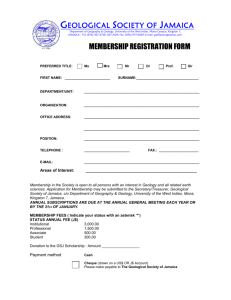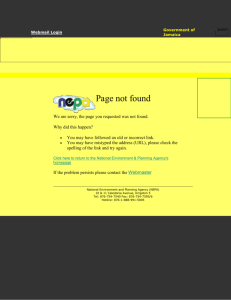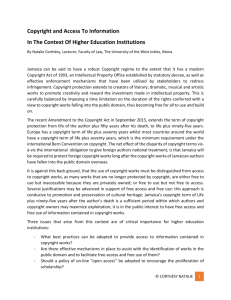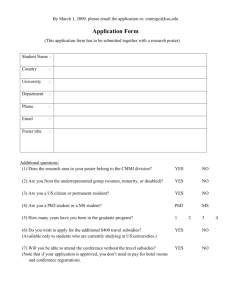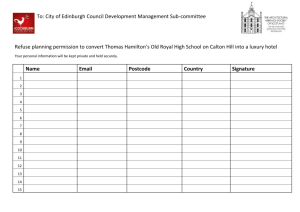Mixed Methods Research Caribbean Conference Detail (4).
advertisement
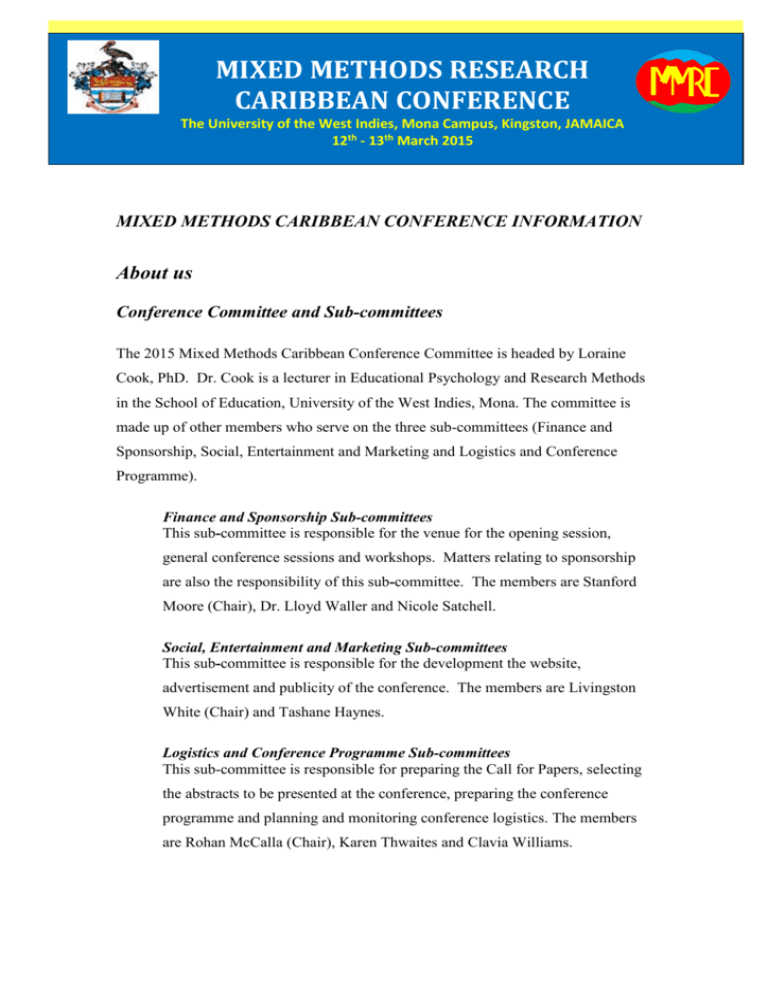
MIXED METHODS RESEARCH CARIBBEAN CONFERENCE The University of the West Indies, Mona Campus, Kingston, JAMAICA 12th - 13th March 2015 MIXED METHODS CARIBBEAN CONFERENCE INFORMATION About us Conference Committee and Sub-committees The 2015 Mixed Methods Caribbean Conference Committee is headed by Loraine Cook, PhD. Dr. Cook is a lecturer in Educational Psychology and Research Methods in the School of Education, University of the West Indies, Mona. The committee is made up of other members who serve on the three sub-committees (Finance and Sponsorship, Social, Entertainment and Marketing and Logistics and Conference Programme). Finance and Sponsorship Sub-committees This sub-committee is responsible for the venue for the opening session, general conference sessions and workshops. Matters relating to sponsorship are also the responsibility of this sub-committee. The members are Stanford Moore (Chair), Dr. Lloyd Waller and Nicole Satchell. Social, Entertainment and Marketing Sub-committees This sub-committee is responsible for the development the website, advertisement and publicity of the conference. The members are Livingston White (Chair) and Tashane Haynes. Logistics and Conference Programme Sub-committees This sub-committee is responsible for preparing the Call for Papers, selecting the abstracts to be presented at the conference, preparing the conference programme and planning and monitoring conference logistics. The members are Rohan McCalla (Chair), Karen Thwaites and Clavia Williams. General Conference Information The presentation format for this conference includes: paper sessions, poster session and panel discussions. Because the theme of the conference is “Mixed Methods in Multidisciplinary Research” it is mandatory that all presentations include mixed methods research. There are three designated workshops which participants are encouraged to consider when registering for the conference (Incorporating Culture and Context in the Literature Review: A Mixed Methods Integrative Approach; Conducting Rigorous Mixed Methods Dissertations; and Implementing Equal Status Mixed Methods Research and Evaluation: Dialectical Pluralism in Theory and Practice). Abstract Submission General Guidelines Academic or Independent Research Papers Papers should be on one of the sub-themes and can describe a wide range of empirical, theoretical or methodological research. Philosophical, argumentative or papers that are reflective in nature or those seeking to present a process, are welcomed. In all cases, concepts and underlying principles should be emphasised, with enough background information to allow a reader, who is not a specialist in the particular subject area, to be oriented. Works-in-Progress Researchers are invited to submit information on current projects, which are either at the proposal stage or are work-in-progress. Presentation of the work at the conference will take the form of a poster. Doctoral Research Papers Doctoral candidates are invited to submit papers describing their research. It is important that your paper is prepared to a publishable academic standard. Papers from doctoral candidates will be subject to the same criteria and processes as academic research papers. It not a requirement that the final results of the research is completed and interpreted. As part of the conference, there is proposed workshop on “Conducting Rigorous Mixed Methods Dissertations.” Important Information to Note Notification of the acceptance of an abstract will be communicated my email to the submitting author(s). Each abstract selected for presentation requires a different registration fee. For authors whose first language is not English, we request that you have your paper proof-read by a native English speaker, prior to submission. Arrangements will be made to publish papers after the conference. For this to happen, at least one author would have had to be fully registered (including payment) and had also presented the work at the conference (see the registration section of the conference website for more information about registration). Full Paper Submission Each person with an interest in submitting a paper after the conference should first submit an abstract describing the research work, proposed paper or work-in-progress. Following email notification that your abstract was selected, you are encouraged to submit your paper for publication after the conference. Provisions will be made for the publication of full papers four month after the conference. Early submission is encouraged as it will help the committee to manage the review process in a timely manner. You will receive notification if your paper should meet the following requirements: 1. Papers must not exceed 5000 words in length (2000 words for work-inprogress papers), including abstract, figures, references and appendices for a total of 10 pages. 2. Before you submit your paper, please ensure you reviewed it for errors. If English is not your first language, have your paper proof-read by an English speaking person. 3. Papers can be produced in Microsoft Word; preferably as a doc. 4. The identity of author(s) will be removed prior to the review of all papers. Selection Criteria The conference committee will use the following criteria as a guide for the selection of abstracts. Your abstract should therefore satisfy these criteria. Abstractsshould be on one of the sub-themes indicated by the conference committee; however the committee may consider research in other areas considered appropriate for this conference. Abstract captures the interest of potential readers of your paper Abstract is written in English Language and is free from errors. Abstract allows the reader to understand what the paper is about and why it should be read. The title of the abstract describes the subject being written about. The abstract makes a clear statement of the topic of the paper and the research questions The abstract is explicit on how the research was undertaken or is being undertaken The abstract indicates the value of the findings and to whom will they be of use The abstract describes the work to be discussed in the paper The abstract gives a concise summary of the findings. The abstract conforms to the word limit of 300 to 500 words. The abstract has keywords or phrases that closely reflect the content of the paper. Presentation Guidelines If your paper was accepted, you are expected to give a 30 minutes presentation at the conference. There will be a computer with PowerPoint and Adobe available for you. It strongly suggested that you restrict the number of presentation slides to 10 or fewer. Please prepare your power point slides to support your presentation. Prepare your slides as a power point file and send it to mixed.methods2015@gmail.comat least one week before the conference. All presentations will be pre-loaded onto the conference computers to facilitate a smooth transition between speakers. It is also recommend that you also bring with you a copy of the presentation on a data stick or other portable memory device. You will not generally be able to plug your own laptop into the conference projection system. If you require special technology for your presentation please say so in your email, while making your submission and we will do our best to help you. Paper Presentations Paper presentations include empirical studies, methodological or theoretical papers. The duration of each paper presentation is 30 minutes. Each 30 minute presentation includes 20 minute presentation and a 10 minute discussion lead by the moderator of the session. The guidelines for preparing the paper presentation abstract submissions are as follows: Empirical Studies 1. Title (Discipline represented) 2. Purpose of the study 3. Participants 4. Method (a description of the mixed methods design) 5. Results 6. Conclusion 7. Implications for mixed methods etc. Methodological or theoretical papers 1. Title (Discipline represented) 2. Purpose of the study 3. A concise description of the problem or issue being examined 4. Overview of the project or theory 5. Method (a description of the mixed methods design) 6. Implications for mixed methods etc. Poster Presentation This section is limited to 10 poster presentations. Poster sessions provide an opportunity for informal discussion. Posters should be self-explanatory, thus free presenter from answering the obvious questions. This section is restricted to empirical research. The conference will provide boards for mounting your poster. Bring more detailed copies of your research for distribution. The suggested measurements for the poster are: 3 to 4’ high and 5’wide (visit the website for any adjustments). Prepare a label indicating (a) the title of your paper and (b) the author(s) for the top of your poster space. Use the following outline as a guide: 1. Purpose of the study 2. Participants 3. Method (a description of the mixed methods design) 4. Results 5. Conclusion 6. Implications for mixed methods etc. Conference and Workshop Registration The early conference registration fee is US$150. Early registration ends on February 16, 2015. The conference fee after the early registration will be US$170. There is a fee of US$50 for attending ONE workshop and a discounted fee of US$75 for attending TWO. Conference and workshops registration ends on March 13, 2015 at 8:30 am. Draft Conference Schedule Wednesday March 11, 2015 6:00 p.m. - Opening Ceremony and Key Note Address - Conference and Workshop Registration Thursday March 12, 2015 8:00 a.m. - 5:00 p.m. Conference and Workshop Registration 8:30 a.m. - 10:30 a.m. Concurrent Session 1 10:30 a.m. - 11:00 a.m. Coffee Break 11:00 a.m. - 12:30 p.m. Mixed Methods Panel Discussion 12:30 p.m. - 2:00 p.m. Lunch 2:00 p.m. - 5:00 p.m. Concurrent Workshops Friday March 13, 2015 8:00 a.m. - 8:30 a.m. Conference and Workshop Registration 8:30 a.m. - 10:30 a.m. Concurrent Session 2 10:30 a.m. - 11:00 a.m. Coffee Break 11:00 a.m. - 12:30 p.m. Concurrent Workshop Part 1 12:30 p.m. - 2:00 p.m. Lunch 2:00 p.m. - 3:30 p.m. Concurrent Workshops Part 2 3:30 p.m. - 4:00 p.m. Break 4:00 p.m. - 5:00 p.m. Closing Plenary and Vote of Thanks Conference Venue This conference venue is the Mona Visitors’ Lodge. For further details on the venue visit: http://www.booking.com/hotel/jm/mona-lodge.html Accommodation and Ground Transportation The conference will be held in Kingston, which has a number of hotels from which to choose. Please enquire about reservations from any of the hotels indicated below. Please feel to use websites that gives reviews of the hotels. This could be a way to help you with your choice of accommodation. Ground transportation from the airport to any destination in Kingston is available by JUTA Tours. Pegasus Hotel The Courtleigh Hotel and Suites http://www.jamaicapegasus.com/ http://www.courtleigh.com/ The Knutsford Court Hotel Spanish Court Hotel http://www.knutsfordcourt.com/ http://www.spanishcourthotel.com/ Hotel Four Seasons Altamont Court Hotel http://hotelfourseasonsjam.com/ http://www.altamontcourt.com/ Directions from Norman Manley International Airport to New Kingston 25 minutes (18.7km) Via Norman Manley Highway Directions from New Kingston to Mona Visitor’s Lodge J.U.T.A. Tour http://jutatourskingstonjm.com/contact-us/ Contact Us For more information on this Mixed Methods Research Conference, please contact: Loraine D. Cook, Ph.D. – (Lecturer) School of Education , University of the West Indies, Mona Campus, Kingston 7, Jamaica W. I. loraine.cook@gmail.com Stanford Moore – Deputy Dean in the Faculty of Social Sciences University of the West Indies, Mona Campus, Kingston 7, Jamaica W. I. moore.stanford@gmail.com Livingston White, Ph.D. – (Lecturer) Caribbean Institute of Media and Communication (CARIMAC), University of the West Indies, Mona Campus, Kingston 7, Jamaica W.I. livingston.white@uwimona.edu.jm Rohan McCalla – (Doctoral Candidate in Educational Psychology) School of Education, University of the West Indies, Mona Campus, Kingston 7, Jamaica W. I. rsmccalla@hotmail.com
